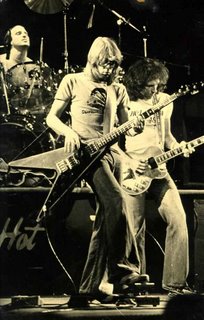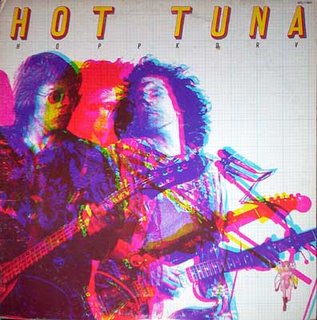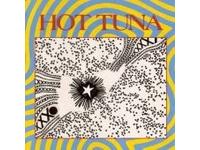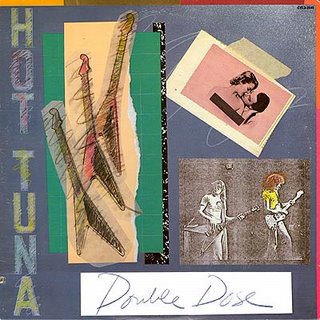The Hot ########Tuna! Phenomenon
Some guys have all the luck. Consider Jorma Kaukonen and Jack Casady, the backbone members of Hot Tuna:
- They got almost no airplay on any station.
- They never had a hit.
- Lots of people couldn't pronounce Jorma's name right.
- They never went along with any musical fads.
- Their album covers were some of the strangest you'd ever find.
Jorma and Jack achieved fame during the 60s for their role as lead guitarist and bassist, respectively, of a certain West Coast band that did a lot of songs about drugs and other topics that won them the ire of our elders. But even after they would be worn out from doing shows with Jefferson Airplane, these two would
 often continue playing, in hotel rooms, clubs, etc. Their material was mostly blues, with a bit of country and other American roots styles tossed in. In 1970 their first album, entitled simply "Hot Tuna," was released. It consisted of lots of blues standards like "Death Don't Have No Mercy" and "Know You Rider," with Jorma on acoustic guitar and vocals, Jack on bass and Will Scarlet helping out on harmonica. The band reportedly chose their name because RCA wouldn't let them use their first choice "Hot Shit."
often continue playing, in hotel rooms, clubs, etc. Their material was mostly blues, with a bit of country and other American roots styles tossed in. In 1970 their first album, entitled simply "Hot Tuna," was released. It consisted of lots of blues standards like "Death Don't Have No Mercy" and "Know You Rider," with Jorma on acoustic guitar and vocals, Jack on bass and Will Scarlet helping out on harmonica. The band reportedly chose their name because RCA wouldn't let them use their first choice "Hot Shit." Eventually Jorma and Jack left the Airplane (hereafter known as Jefferson Starship) and recorded more albums. Jorma switched over to electric guitar, and they were joined by drummer Sammy Piazza and famed fiddler Papa John Creech. Jorma's fingerpicking style, which involved a lot of heavy thumb work, was influenced by
 the Reverend Gary Davis, a blues master. As for Jack, he sounded a lot like, well.... Jack. In truth there has never really been a rock bass player like him. Jack never seems to have played a pattern, yet his timing was solid, and he could groove like few others. Few rock bassists had such loyal followings, and crowds would cheer when he would solo during tunes such as "Funky Number Seven."
the Reverend Gary Davis, a blues master. As for Jack, he sounded a lot like, well.... Jack. In truth there has never really been a rock bass player like him. Jack never seems to have played a pattern, yet his timing was solid, and he could groove like few others. Few rock bassists had such loyal followings, and crowds would cheer when he would solo during tunes such as "Funky Number Seven." As time went on, Hot Tuna got louder, although Jorma and Jack would still sometimes perform simply as a duo, with Jorma on acoustic guitar. In this sense, they pre-dated the "Unplugged" movement by years. "Acoustic Hot Tuna" and "Electric Hot Tuna" were very different, although most of us enjoyed both. In
 NYC they would typically play the Academy of Music on 14th Street, just east of Union Square, playing two shows a night, one at 8:00 and the other 11:30. Hard core Tuna fans usually chose the latter, since without time constrictions Jack and Jorma would often play four-hour continuous sets - followed by up to three encores. It was obvious that these guys loved to play, and their dedication to their music, without a lot of BS, was a refreshing thing in an era of hype and glitter. One night, when my brother and I didn't come home by 5:00 AM, my mother called the police. The desk officer assured her "Lady, we get lots of calls from parents when Hot Tuna plays."
NYC they would typically play the Academy of Music on 14th Street, just east of Union Square, playing two shows a night, one at 8:00 and the other 11:30. Hard core Tuna fans usually chose the latter, since without time constrictions Jack and Jorma would often play four-hour continuous sets - followed by up to three encores. It was obvious that these guys loved to play, and their dedication to their music, without a lot of BS, was a refreshing thing in an era of hype and glitter. One night, when my brother and I didn't come home by 5:00 AM, my mother called the police. The desk officer assured her "Lady, we get lots of calls from parents when Hot Tuna plays." Jorma an
 d Jack continue to play to this day, both together and in solo acts, and Jorma operates a well-known guitar camp.
d Jack continue to play to this day, both together and in solo acts, and Jorma operates a well-known guitar camp. When I recently told a friend that I had been a Hot Tuna fan she laughed. I'm not sure why; maybe she thought that it was akin to following the Bay City Rollers. As someone who grew up on pop music, I wouldn't be surprised to hear that she never even heard Jorma and Jack. If so, even she would be forced to agree that these guys helped turn more of us on to real blues than any other band.

1 Comments:
Hot Tuna forever!!! Love these guys acoustically, love 'em eletrically!
Post a Comment
Subscribe to Post Comments [Atom]
<< Home